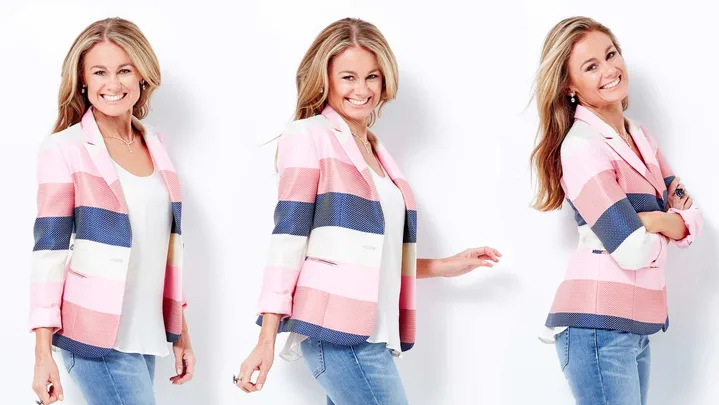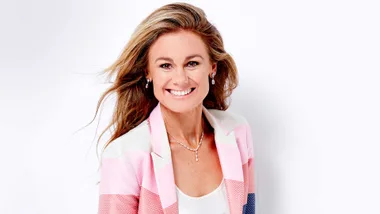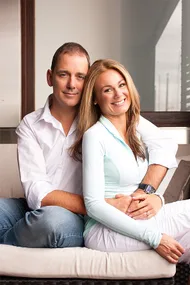Here is what happens to people when they meet Dr Libby Weaver. They return changed, as if they have been touched by the sun.
“She told me I had a beautiful soul,” they say quietly, a soft glow in their cheeks.
The Dr Libby effect is profound – and far-reaching. Her seminars across Australia and New Zealand are often sell-outs and the atmosphere in them is one of extreme enthusiasm.
She’s funny and she’s kind, and she’s also prolific at writing, so when the opportunity to interview her about her new book What Am I Supposed To Eat? came up, I jumped at the chance to sit opposite Libby in the flesh and feel that effect one-on-one. Shamefully, I wanted to be told that I, too, have a beautiful soul.
So on a sunny winter’s day in Sydney, at a small café in the leafy suburb of Rushcutters Bay, I am sitting across from Libby herself, all shiny hair and glowing skin, chicly dressed in a cream turtleneck, colourful scarf and slim black pants.
And it’s all going smoothly until I go to move my Dictaphone and accidentally knock her water glass over, tipping the entire contents all over her, her chair, her part of the table. I have come all the way to Sydney to drown Dr Libby in a public setting, it appears. My soul has never been less beautiful.
She is, of course, delightful about it, which is no surprise as she is known to be a delightful person. In fact, from the second she bursts into the café, talking a mile a minute with her business partner Chris Weaver, she is everything you would imagine.
She’s a woman so relentlessly positive that she’s managed to make that particular situation work out smoothly as well; Chris is not only chairman and CEO of the Dr Libby brand, he was – up until late last year – also Libby’s husband of 10 years. Until, out of the blue, the pair released a joint statement on Libby’s Facebook page saying they had split. The wording was intimate and clear – while the marriage was over, the professional partnership would continue on.
Libby wrote: “In September this year I shared with my husband Chris that I wanted to honour my introverted nature and that I wanted to end our marriage. For the past three months we have travelled together throughout Australia and New Zealand with our work, while also allowing our-selves the space to grow accustomed to our new way of being together.
We have continued this as closest friends, treasured confidants and business partners… Chris will continue as our chairman and CEO and I will continue writing, researching and speaking. Chris and I have treasured our 10 years together and we remain very much a team.”
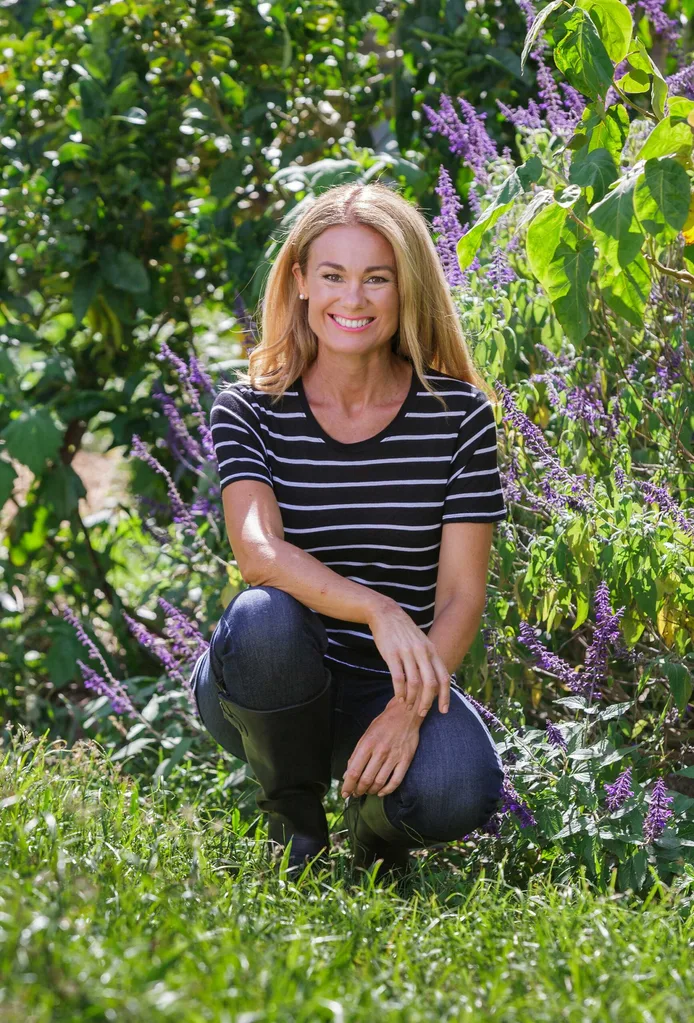
Eight months after that statement was released, it’s clear they meant it – they’re very much still a team. At the café, Chris runs his menu option past Libby and jokes how handy it is to have ‘your own personal nutritionist’ for such quandaries, before heading off. Once our interview is over, she’ll be meeting up with him for their next appointment.
When she’s on the road, they travel together, along with a couple of members of their team. It is, to all intents and purposes, business as usual. And she never doubted it would be.
“We work incredibly well together, we created the business together. So that for me was never in question,” she says.
“The minute there’s anything that feels a bit off for either of us, we have a conversation about it. If there’s a decision to be made and we don’t agree, he listens to my side and I listen to his. We’ve always had really good communication and that’s continued. We have a beautiful trust and a really great respect for what each other has brought.”
The Dr Libby Weaver business is a juggernaut; when we featured her in NEXT 18 months ago, she was on the road 150 days of the year; she reckons it’s down to 120 days now.
She tours every September and October across Australasia; this year she’s also been to Europe for the launch of Das Rushing Woman Syndrome – the German version of her best-selling book. It’s been very popular in Germany, even more than when she tried to launch it in the US.
The issue with America, she says, was they didn’t understand ‘Rushing’ – it’s not a phrase they use. One journalist tried to change it to something like ‘Manic Woman’s Syndrome’, but Libby was quick to point out, she laughs, that it wasn’t quite as extreme as that.
The point is, she’s big. Internationally big. Losing a business partner as well as a husband could have been a serious cost. But the pair have made it work and are now closer than ever. “That’s how it feels for me and he says the same.”
“He’s an extraordinary human. I’ll always love him. He’s a treasured friend,” she says. “We have an extraordinary friendship and a really deep appreciation for each other, and because we trust each other, we have been able to keep working together.”
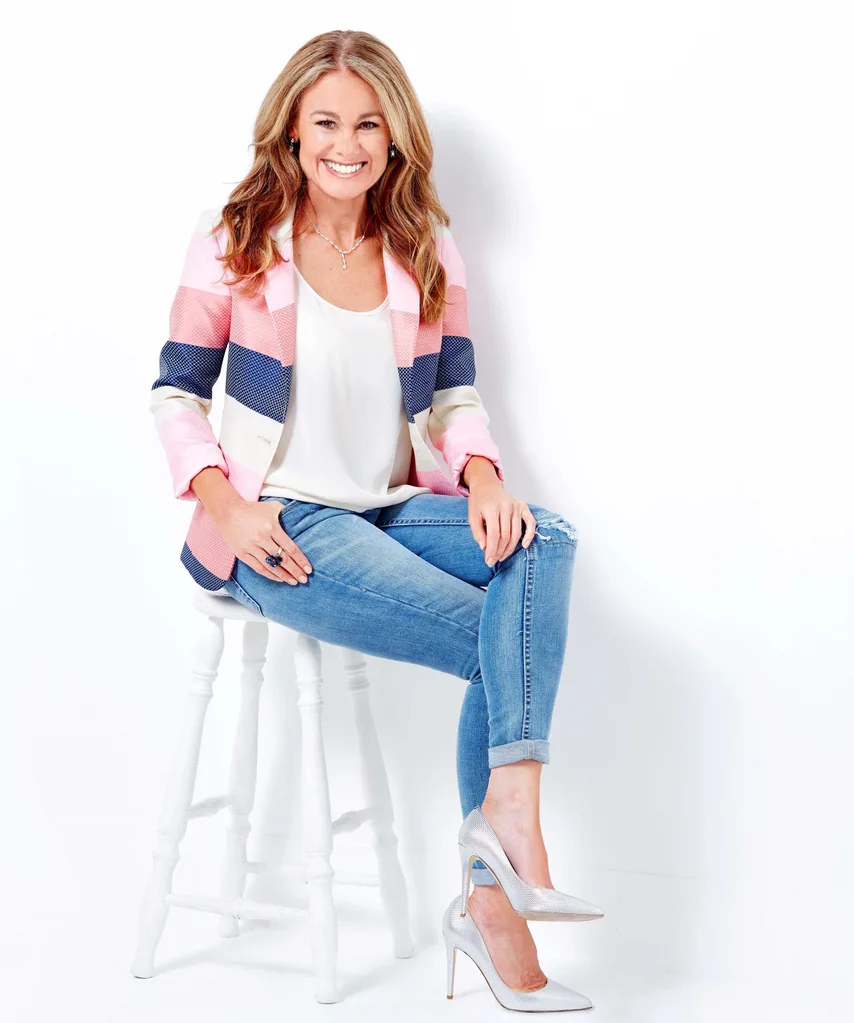
Libby is an introvert, something that’s such an important aspect of her personality it was even part of her statement about why she and Chris were separating.
Introverts, as she defines them, are people who are energised through solitude. But she’s clearly also energised through her work. At one point during our chat she describes her attitude towards explaining people’s symptoms as being “like a detective. I’m relentless until I figure it out.”
Case in point, I mention in passing I’ve been taking her Bio Blends Daily Greens and Radiant Reds powder and it’s helping soothe my eczema. She is immediately intrigued by this – am I iron deficient?
When did it start and what was happening in my life at that time? – and comes back to it twice during our chat, trying to find the cause. Detective Libby is on the case.
“There’s always a reason,” she says. “Sometimes it’s physical, sometimes it’s emotional.”
Emotion is a big part of Libby’s method-ology. She wears her heart on her sleeve, one of the reasons she and Chris decided to release that joint statement on Facebook.
“People would inevitably find out and I wanted people to hear it directly from us – rather than a made-up rumour.”
The public reaction to their separation after 10 years together made her cry. “People were incredibly generous. I feel that they connected to the authenticity and the honesty, and had an appreciation for how challenging it was.”
It’s a challenge that has worked out; not only have they successfully navigated this new ground over the past year, they’ve also produced a new book.
The latest addition to the Dr Libby brand is What Am I Supposed To Eat? It’s the question we’re left with as too many health food headlines make their way into our consciousness, it’s the question her patients used to ask when she was seeing them one on one, and it’s the first thing people at her seminars now line up to ask her at the end.
It’s also what’s running through my head while sitting opposite Libby at the lunch table. What do you order in front of one of the world’s biggest wellness gurus?! I settle on steak and vege-tables – surely you can’t go wrong with that – and she gets a roast vegetable sandwich. I don’t enquire about the gluten content of the bread because that doesn’t seem like the kind of thing to do in polite company.
Food is an area which Libby has avoided, up until now, getting too prescriptive with. Her goal has always been to tell you why you need to eat what you should eat based on your body’s biomechanics, rather than handing out meal-plan tips. But the trouble is, everybody wants specifics.
“People will say, ‘I’ve read about the benefits of being vegan, I’ve read about the benefits of paleo, I’ve read about the benefits of what’s now called keto… should I be vegan, paleo or keto?'” she says.
“You can still pick up a book that tells you to eat carbs because they’re essential for energy then next to that will be a book that says don’t eat carbs because they’ll make you fat and tired. How are people supposed to make sense of well-meaning information, when it’s conflicting?”
It doesn’t have to be that hard, she explains in her book: ‘food isn’t healthy, people are. Food is nutritious. Or it’s not. And the more nutritious food you eat, the healthier you will tend to be.’
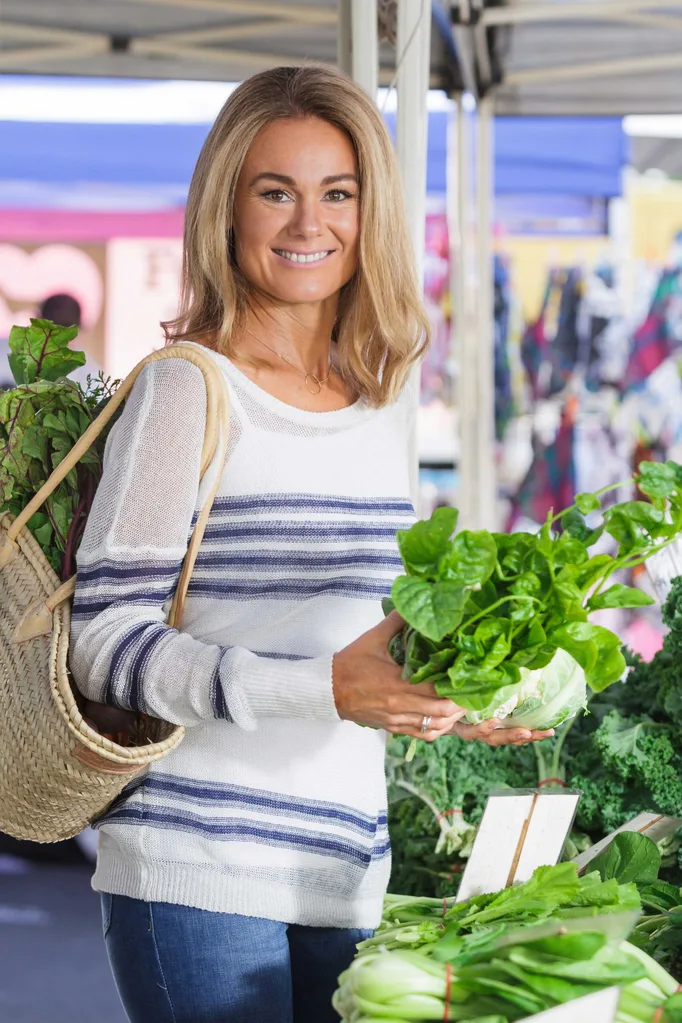
When it comes to following official health advice to the letter, Libby knows first-hand how damaging that can be. In fact, it’s part of her origin story. Before she was a global success, before she was the wellness guru who awakened women to just how stressed their bodies were, she was a twenty-something with a debilitating sickness.
Back when Libby was at university, gaining her PhD in biochemistry, the two biggest food rules of the time were the food pyramid, and the calorie-counting equation. And because Libby was then, as she is now, a total ‘goody two shoes’, she was following both sets of instructions down to a tee.
The food pyramid said grains were the food group you should be eating the most of – around seven servings a day – and the calorie-counting model presented a mathematical equation that told you exactly how many calories you needed to maintain weight and to lose weight.
So Libby, at that stage a registered and practising dietitian, was so grain focused she was even baking her own bread, as well as adhering to a calorie-controlled diet: 1800 calories if she was on weight management, 1500 calories if she was on weight loss.
But her body wasn’t following the equation. Sometimes her clothes would be tighter on the lower calorie diet, sometimes it was the other way round. Confused, she recalls going to her lecturer and asking why this was, only to be told she was probably doing it wrong. So she tried harder, even though she knew she was already doing everything right.
Then things got serious. She started to lose a huge amount of blood from her bowel and dropped a dramatic amount of weight in short order. She had diarrhoea, sometimes up to 12 times a day, to the point where she couldn’t leave the house before midday. At just 24 years old, she was convinced a bowel disease diagnosis was around the corner.
“But even with my knowledge, I kept thinking ‘the body heals itself, everything will be okay,'” she recalls. “I still can’t believe it took me so long.”
Her GP wrongly diagnosed her with a haemorrhoid; so Libby went to a different doctor and asked for a referral to get a colonoscopy and endoscopy. The results came back: no disease, but no solution either. Libby can still recall getting the phone call where she told the doctor ‘I can’t leave the house before midday – what am I supposed to do?’ His response? ‘You’re the dietitian. You figure it out.’
At the time, Libby was working with autistic children as part of her PhD research into gut function. Some of the kids were highly susceptible to dietary changes and Libby had noticed that the foods they craved were the ones that were the worst for them. Transferring that logic to herself, and her capital letter LOVE for bread, she removed it from her diet completely. Within two days, the blood loss had stopped. It was, in every way, life-changing.
“It smashed me open because it made me see that a) there’s no one way for us all to eat and b) the body has the knowledge. You see the absolute magnificence of the [body’s ability] to heal. I’ve never, never lost that gratitude for my health and for my energy.”
So when you see how almost evangelical she is about wellness, there is a reason. She wants people to be as jazzed about their health as she is and – most importantly – not take it for granted. Paying attention to what our bodies are trying to tell us is one of Libby’s big messages.
“People are so focused on a to-do list, on getting everything done and meeting every-one else’s needs, they’ve stopped noticing they get reflux when they eat pastry, they’ve stopped realising they get a headache every afternoon at 3 o’clock. If we just take a pill to deal with the problem, we miss the message our body is giving us – and sometimes that message is about our food choices.”
The issue, she says, is that the feedback from our bodies gets louder as we get older but we just write it off as the ageing process.
“People don’t pause, they’re not curious about why they had great energy at 25 but at 35 they don’t. When people do question it, they just think ‘oh, I’m getting old.’ If that were true, every 85-year-old wouldbe exhausted. And they’re not. It’s feedback about our choices – and food is a place to start.”
At various points of our conversation, the café’s barista hovers around us to sometimes offer coffee but more often to quite blatantly listen in. During the ageing chat, he comes over to bemoan that ever since he turned 30, his body has started falling apart: “I can’t play golf, which is the most upsetting thing.” Libby – kind, polite, always interested – starts asking him some gentle questions. The doctor is in.
Libby is great company, even though she considers herself more of a writer than a talker. That’s not to say she doesn’t love a good deep and meaningful with her girlfriends, a collection of women she’s known since her school days. “I’d much rather have – I call it depth dialogue – than small talk. So at parties I’m not much fun!”
But if she has a problem she needs working out, she turns to her journals first. She’s been writing in them since she was four, and yes – she’s kept them all. The ones from her youth are a particular highlight, she laughs. “It makes you have a huge appreciation for the little human we all were. I love it.”
Apart from typical chat on “boys and friends”, there is one part of her teen years that featured heavily in her journals as a young woman. When she was 17, she was given a scholarship to go to school in Germany for a year.
Her parents weren’t travellers, didn’t even own passports, so this was a very big deal to the close-knit family of three (Libby is an only child). It was challenging, but it shaped her, she says. It was only while walking the same streets in Hamburg this year as part of her book tour, the first time she’d been back to the city since her high school years, that she realised how much impact it had on her.
“I can see in hindsight that it contributed enormously to my independent spirit and some beliefs in myself that everything will work out, that I can solve things, that I can find my way.”
She talks about not being someone who has regrets, but how she made a conscious decision a few years ago that the one thing she wanted to change was to see more sunsets. So, every other day, she turns off her computer and goes outside to watch the sunset. Sometimes she goes back to work after that; she doesn’t agree with the phrase ‘work/life balance’, which might surprise you.
There are times she wants to work till 10pm, if she’s feeling particularly juiced about something. Or she might want to go for a walk or catch up with a friend instead.
“So balance isn’t a word I use, and I don’t seek it, because it’s forever changing.”
There are priorities of hers that don’t shift, however. When I ask what she sees way in the future, what a 60- or 70-year-old Dr Libby looks like, her list is simple: “Nature, vegetables, little birds I can have chats to. Writing, reading; that’s probably all I need.”
For someone who is still only months into what is quite a major life change, there is a level of serenity to Libby it is tempting to get on board with. What’s her advice to surviving change and building resilience, of trying to keep our head afloat when everything around us is in flux?
The key, Libby believes, is to trust. “It’s so easy for me to say and it’s so hard to do when it’s happening to us. But trust. Trust there’s something you can do with this that will help you or be of service to other people. There has to be a belief that if it wasn’t for you, it wouldn’t be happening. But it does take a massive level of trust.”
Trust is something she’s had in spades; as the 17-year-old, far from home, trying to find her way around a foreign city; as the 24-year-old who knew she could work out what was wrong with her ailing body; as the 42-year-old knowing her closest professional relationship could sustain a personal separation. Libby trusts in the process, no matter how hard it might be, and knows how to find happiness along the way.
“When you have a really hard month or year, and you lose people close to you, or there’s a huge amount of change, if you haven’t been connected to all the juice and all the joy, you can get caught up in the chaos. As humans, we go from one extreme to the other: from happy happy joy joy to ‘oh my god disaster’. Whereas life is kind of all of that at once. Even when it’s really difficult, there’s still joy to be found.”
And with that, and a final hug, and a thank you for being such “a beautiful human”(!), she’s on her way, with plenty of joy left to discover.
